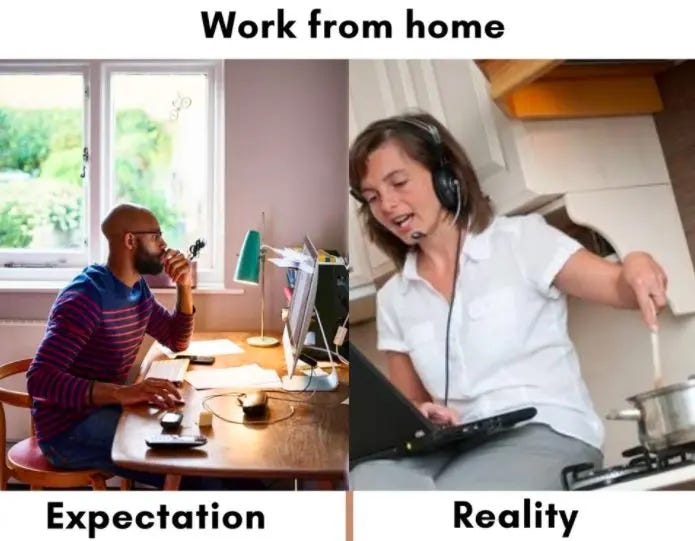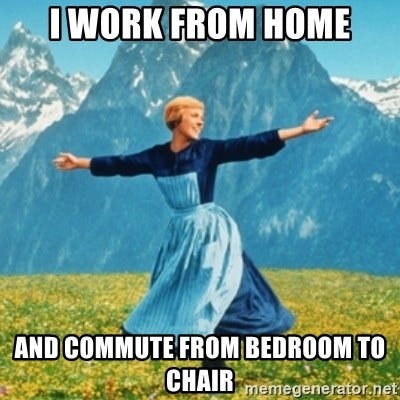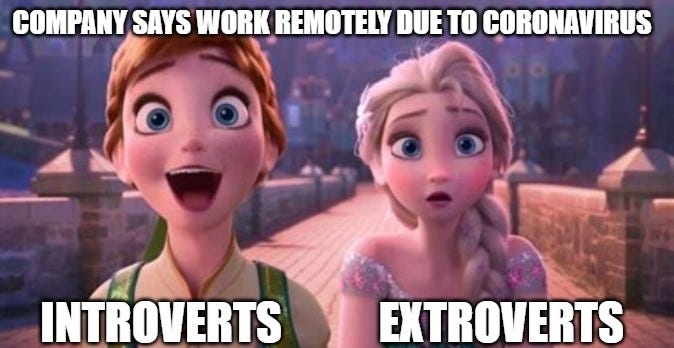WFH: Work From Home(stead)
WFH implication for job markets, real estate prices, urbanism & culture
The Great WFH War
An amusing feature of FinTwit (Financial Twitter) is the seemingly compulsive need of many commentators to have purely black-or-white opinions on everything.
And somehow, very little seems more triggering than the debate about working from home (I will only use the WFH form later in this article).
One side of the debate claims that this is a total scam, another absurdity of a world gone mad during the pandemic. The idea is roughly that:
Most people are just pretending to work.
It is impossible to be efficient without face-to-face human interaction.
This is destroying the company's “culture”.
Onboarding new employees or fresh-out-of-school graduates is impossible via Zoom.
The other side of WFH enthusiasts and true believers fights back viciously, with a few contentious points being:
Most office “work” is make-believe work in the form of useless meetings that could’ve been an email.
The commute is 1-3h/day, soul-crushing, life-consuming, and utterly useless.
Company culture is sitting on a bland white open space cubicle, alone for 8h, in a perpetually noisy environment.
Work from home neutralizes office politics, leading to work being judged on outputs, instead of personal relations and office intrigues.
For sure I am far from objective on this debate. I have worked from home way before it was cool and have done so for most of the past 10 years. I did it as an entrepreneur, as a sales guy, and as a writer.
So I am sort of amused at so many people discovering that what I did every day for a decade was actually possible. Yeah…what a surprise!
Let’s not forget this is a discussion for white-collar and email job workers. No one expects WFH for cooks, taxi drivers, factory workers, and nurses. So let’s also not blow that topic out of proportion.
In any case, I am convinced that WFH or hybrid formulas are here to stay.
I will explain why and why there is so much disagreement over it. And I will explore the macro consequence of WFH.
The Reasons For The Divergence
The divergence and intensity of the debate is because most of its roots are psychological. People actually disagree about personality traits, power struggles and
Introversion Levels
Some people like solitude, a quiet and peaceful environment. Others thrive in social interactions and intense, active setups.
Guess which ones love to work alone, in pajama in their bedroom…
As this is mostly a personality trait, this is not debatable.
In French we say “of tastes and color, we don’t debate”. Because these will be mostly sterile and pointless discussions. And bound to make people irrational or angry.
The Place Of Work In Life
The truth work from home revealed is that most people do NOT like their colleagues. They are not altogether a happy family. When taking a break from work, they like a lot better to see their kids grow up, play with their dogs, and kiss and spend some time with their wife/husband.
For most people, this is better than small talk at the coffee machine. Go figure.
Not surprisingly, some people that actually DO enjoy the office are deeply offended. When WFHers says “anyway, we hated time in the office”, some people hear “anyway, we hated time WITH YOU in the office”.
Talk of a harsh realization…
So I suspect a lot of the anger I see on both sides stems from this point.
WFHers sees the back to the office tentative are severely reducing their newly found quality of life.
Office believers take it as a personal attack.
City Lovers vs Suburb And Rural Dwellers
The commute part is also telling. Only people living far from the office have this problem. Usually with family and kids.
Childless urban dwellers are often less concerned with traffic jams. They also enjoy more the office social life.
So these lifestyle differences make the perception of WFH hard to reconcile. The stressed-out suburban dad/mom does not share the young urbanite’s enthusiasm for the office and will fight a lot harder for WFH.
A Power Struggle
Another big factor is the power relation between the 2 parties.
Most of return-to-office advocates are entrepreneurs, bosses, and middle managers.
Most WFH fans are employees.
The problem is WFH PROVED that most in-person meetings were not needed. That workers could often coordinate and motivate themselves.
This puts a lot of middle managers’ jobs in danger. If workers can “manage” themselves at home, why does the company need managers at all?
With most bosses former middle managers, this puts in question a lot of previously assumed hierarchy.
So this is somewhat existential for a lot of high-earners aiming one day for some sort of top position.
And then comes the office politics question. Getting promoted is often more linked to being liked by your manager than doing a good job.
But it is almost impossible to build this kind of relations without in-person break time, team-building events, post-office bar crawls, etc…
Meanwhile, WFH makes everyone's individual output a lot more clear. No more options to pretend it was from some nebulous teamwork.
So most high flyers and ambitious corporate ladder climbers are very threatened by WFH.
WFH consequences
Job Market
As I said above, the pro- and anti-WFH debate is in large part a power struggle. So we should expect a schizophrenic job market.
One segment will be back to the office, because management has the upper hand power-wise. This will be true in finance and legal, as who you know matters a lot, but also for all the replaceable, low-level staff.
If you had no bargaining power over salary before, you will have none about WFH. It also does not help that this level of employment tends to have worse work ethics, hence making WFH a hit-or-miss proposition depending on the person. A lot of them will indeed not work if not bullied into it.
On the other hand, good programmers, top engineers, salesmen, writers, etc… will be able to get what they want. And many seem fine with less salary as long as WFH is available.
Generally, the more technically skilled a person, the more they hate to waste time in meetings, petty office politics, and commute. So the best in their field will likely want WFH in a huge majority.
This creates an extra problem for office-only companies. They will compete over retaining a quickly dwindling pool of top talent. While smaller, more flexible competitors will snatch their best minds.
For this reason, for any company driven by IP, R&D, and general innovation, I will from now on consider the absence of WFH policy a red flag.
Real Estate
The obvious consequence is a lowering in office space demand. This is already ongoing, especially in the most expensive locations like San Francisco. That most of this office space was occupied by jobs easily done remotely, like programming and IT does not help either.
This should also severely hurt a lot of banks. Now places dependent more on finance like NY will fare better.
This could create opportunities for NY real estate firms whose stock prices are crashing when their real prospects are not so bleak.
Virtualization Of Cities
The last effect will be on geography, urbanism, and globalization.
If you work from home, you can do it ANYWHERE as long as the internet is good. For now, people talk about how this means you can move to Montana and continue your job which was previously in LA, SF, or NY.
This is massively negative for downtown real estate, but also the suburbs. And massively positive for smaller towns with low crime rates and less pollution.
It is also a big factor in the “great migration” from California to states that will lower taxes and better infrastructure and social conditions, like Texas.
Brutal Global Competition
But if you can work from the depth of Kansas, you could also do it from Panama, Estonia, or Thailand.
This means that white-collar jobs are suddenly getting exposed to the competition factory workers have suffered for decades with little interest or empathy from the city-dwelling white collars.
“Learn to code” they said to the blue-collar workers whose jobs were moved to China.
“Learn to wield” will be the answer when a Bulgarian programmer takes a Californian job for 1/4th of the salary for the same or even better output. This was already happening, but the pandemic will make what was going to be a reality in 2035 happen in 2025.
Any remote job is open to everybody, everywhere.
I suspect few of the coddled western white-collar workers are ready for this harsh reality.
On the positive side, this should help radically balance politics in Western countries.
“Real” jobs are harder to move remotely to a cheaper country. The rural areas and hinterland regions will get richer, and the big city, and coastal elites less powerful.
In theory, this should reduce populism and political division. In practice, it will depend on how the former winner of the globalization game reacts.
The Return To Physical Production
Because remote work makes most activity essentially nomadic and fleeting, most countries that want to stay wealthy will fall into 2 categories:
Centralizing, fiscally and/or physically remote work in their territory, capturing the added value of the world's intellectual labor.
Build unique advantages on PHYSICAL production that bring a competitive advantage in price, quality, etc…
In this game, China will do fine. Whenever you see China dominating a sector, it is always some industrial physical production: solar panels, batteries, rare earths, all are quasi monopolies because of the local physical industrial ecosystem. Japan and South Korea as well.
Beautiful weather or nice living conditions will do fine as well if combined with low-income taxes. Think of Panama, Portugal, or Costa Rica. Some areas could do extremely well in that framing, like the South of France and Italy, but will need to get their politics and fiscal system in order.
Tax havens and trade centers will be fine as well, like Singapore.
Countries relying on IP and soft power will struggle. The US will need to re-industrialize quickly instead of getting foreigners to build the chips and iPhones they design. Because that design work will sooner than later be everywhere and not need California anymore.
So this is positive for Asia, negative for Europe, negative to neutral for the USA, and extremely positive for Central America, and any warm & safe country with low taxes.
It is also great for regions with good human capital but poor access to the global economy. For example central Asia, remote South America, the Pacific region, etc…
WFH: Work From Homestead
I think the last important effect might be the emergence of new cultures and ways of life.
While maybe less consequential on a macro level, it is the one I am personally the most excited about.
I am myself living in the countryside, exurbs of the local “big” city (500,000 inhabitants), with no neighbors and 1 acre of land/garden/orchards.
When I take a break from work, the next minute I can be weeding my garlic bed. Or playing with my 5-year-old. Or doing a few pull-ups outside.
In parallel, we are starting to acknowledge as a culture that you cannot really do intellectual work well for 6-8h in a row. This is why so many hype tech companies and startups spend a lot to have nap areas, tennis tables, and other facilities.
But all of those are artificial alternatives to a healthy family and personal life. Like what fake meat and empty calories are to a healthy diet. And you are still crammed into a crowded, often dirty, and violent city.
Remote work can give you the best of both. You can make a living working 4-5h of very intensive intellectual work. And recharge with nature and meaning in your life the rest of the time.
And this is a such an attractive proposition that it might be unbeatable, especially for family-minded or nature-oriented people.
And for the other, there will still be large industrial centers and cities to serve them. But no longer will you need to choose between rural poverty and urban personal misery.
I am convinced we will see the emergence of a new lifestyle, combining high-performance, hyper-productive intellectual jobs 50% of the time, with the rest used to reload the mind with art, gardening, sport, homeschooling, etc…
In an extremely delocalized and acentric way.
And just to powercharge this concept, we are also reaching the point of delocalized, universal high-speed internet coverage with Low-Earth Orbit (LEO) telecom satellite constellations like Starlink.
A geography made of a constellation of productive, wealthy, and nature-preserving homesteads, with a few industrial centers, seems like a much more attractive proposal than 15-minute mega cities to me.

I can already imagine a few ways to monetize such a change:
Become an influencer/leader in that lifestyle.
Acquire and develop land for it, or build an entire community from scratch, instead of the traditional suburbs real estate development model.
Provide service to this newly affluent social class with new needs and different life goals:
Remote HR.
Homeschooling assistance or the return of old-school 19th century-style personal tutors.
Permaculture/homestead consultant or landscaper/farmhand.
Homestead-sitting services, for when the owner goes on working travel or holidays.
Community building software and other tools to connect like-minded local workers from homesteads and build close private networks and social web.
Conclusion
So that turned out to be longer and with more to unwrap than I initially expected. Let’s resume it.
The key investing takeaways are:
WFH is here to stay.
especially for high earners and top performers.
the different opinions about are either:
due to personality type divergences, pointless to discuss.
due to a power struggle internal to the workplace, so will sort out depending on bargaining power.
Commercial real estate (CRE) is screwed.
especially in IT-driven cities.
but not so much in financial centers, this might create opportunity during the CRE dislocation.
exposed banks are in trouble as well.
Companies that refuse WFH will struggle to retain top talent or innovate.
The white-collar job market will become extremely brutal and competitive
both nationally and internationally.
Top earners and talents will have even more bargaining power than before.
Geographically:
very good for remote regions, Central America, and any low tax/warm places.
bad for most of Europe.
bad or neutral for the USA.
neutral or good for Asia.
A new lifestyle of “work from homestead” could create very real new business opportunities.







“This could create opportunities for NY real estate firms whose stock prices are crashing when their real prospects are not so bleak.”
Completely agree. Companies with Class A real estate such as Vornado Realty (VNO) are trading at ultra depressed prices. NYC’s never going away